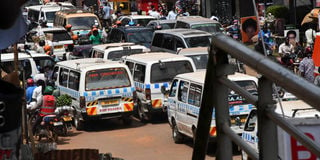To drive, take a taxi or boda boda?

Taxis in Kampala. While taxis migt be safe, you may not get to your destination in time. PHOTO /EDGAR R. BATTE
What you need to know:
A worker at a petrol station that prefers anonymity says this very month they have lost about 30 percent of their customers attributing it mostly to people parking their cars at home and opting for other options
Ugandans are feeling the financial pain at the pump following the high fuel prices without hope for a solution anytime soon.
Fuel stations across the country have increased their prices, with fuel crossing the Shs5,500 mark.
Russia’s invasion of Ukraine has triggered a global price spike over concerns of a supply crunch.
A worker at a petrol station that prefers anonymity says this very month they have lost about 30 percent of their customers attributing it mostly to people parking their cars at home and opting for other options.
To drive?
An average SUV on average does 5 to 6 Km per litre.
Lindacy Nantaba, a resident of kinawataka along ‘ekya Kabaka’ road moves 20km to and from work and her children go to school in Bugolobi adding 11km to her journey.
“I spend about 5 litres every day on average. A litre costs about 5,400 where I buy from (Shell) which translates to about Shs27,000 on fuel per day. But in reality, I spend at least Shs40,000 because sometimes traffic is very bad and it consumes a lot of fuel.”
The situation is not so different for Zedekia Mbeta Mwesigwa, a family head of six, who resides in Buwate Najera two.
“I leave home go to work and drive back. Considering the traffic along Ntinda road that is usually very slow during peak hours, I need Shs50,000 to fuel the car for a 30Km distance on average to the different locations of my three active sites. This can go high or a little lower depending on which site I am going to that day. ”
Pros
With more than one person especially now that the children are going back to school, it may become cheaper in the long run to fuel your own car and drop everyone.
Cons
Having operational cash for fuel every day is now harder.
Fuelling full tank is not affordable to average income earners and yet it still gets used up much faster than in the past.
Boda Boda
During holidays, Mwesigwa parked the car and used a boda for the errands around town. “Grabbing a direct boda to town is very expensive between Shs15,000 and Shs 20,000,” says Mwesigwa.
Gideon Tugume, a resident of Gayaza has had it rough with bodas and taxis and decided to park both cars at home.
“With Shs10,000 in my low consuming car, I would go to my office on Buganda road and back home. This money could only get me about 1 and half litres of fuel when the litre reached Shs5,500, the solution was to use public means. I needed more than double what I was using before. On a boda I use about Shs20,000 to and from which is less than when am driving.” Tugume says.
He, however, has been involved in three accidents these last two months, although minor.
“One of these boda men admitted he just got it and is learning on the road because he must earn a living,” lamented Tugume.
Pros
They are very time saving especially during peak hours.
Cons
Bodas are very risky. On February 12, 2018 Daily Monitor published a story indicating how in three years they had killed 7,000 people.
Taxi
Mwesigwa tried the option of taxis to save but vowed never again.
“From my home to Najjera taxi stage, I needed a boda of shs. 1,000 then in a taxi its Shs3, 000 to Shs5, 000 (it’s not consistent). The experience was not worth it, “says Mwesigwa.
When Tugume tried sitting in a taxi, it was a nightmare.
“I reached 11a.m at office yet I had boarded at 8a.m. Now imagine the employees, at least for me I am my own boss. It can even take about three hours for them to get 14 passengers then they keep dropping and picking others along the way. Who can blame them? The fuel issue is affecting them too,” he says
The fare is about Shs6, 000 and is never constant because the prices are volatile. You can’t leave home knowing how much you will spend on transport.
Pros
It is safer around town where there is reckless driving and it is the cheapest means currently.
Cons
The taxi never sets off until full regardless of the time taken at the stage.
When it finally does, it stops intermittently to load and offload passengers. Some taxis are very dilapidated. But on most stages, the one you found must be filled first.





